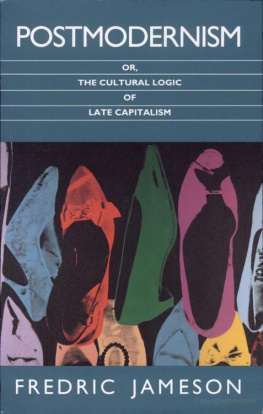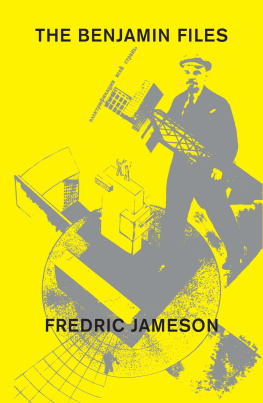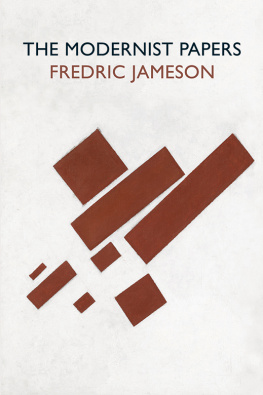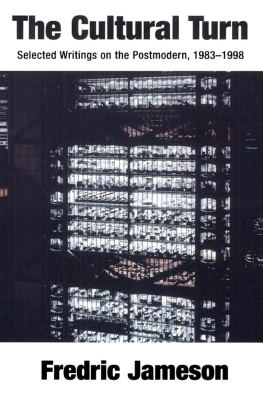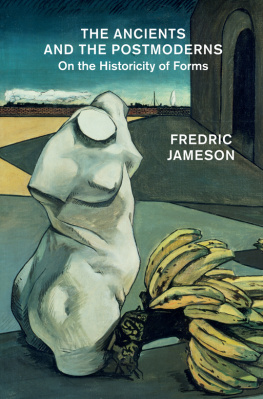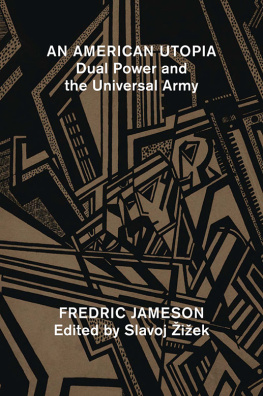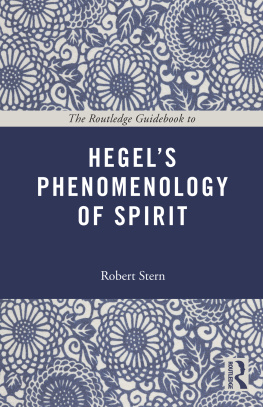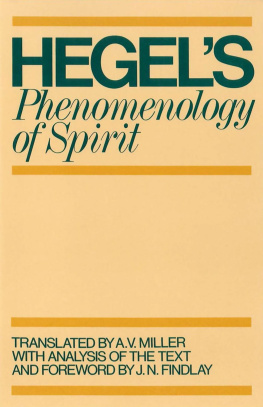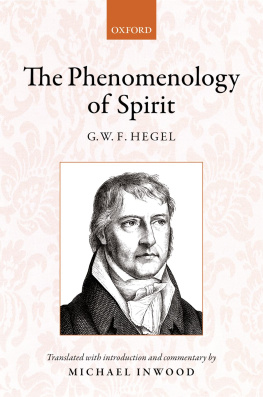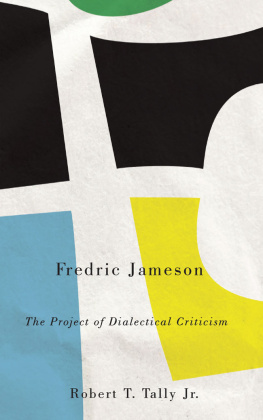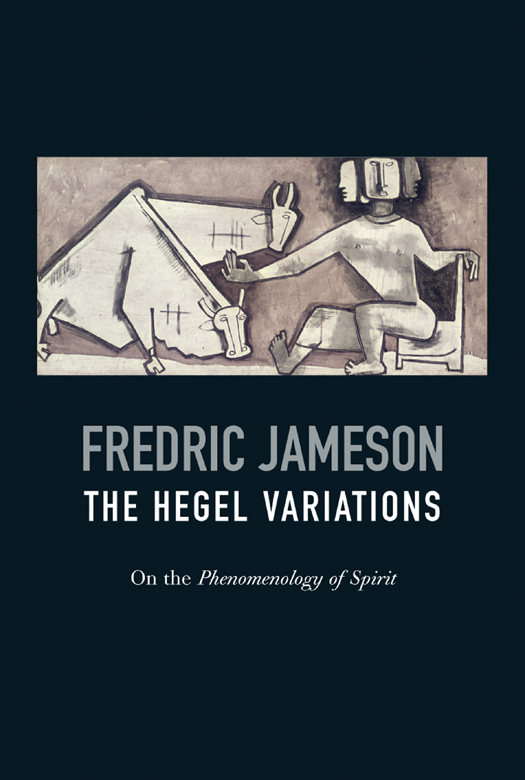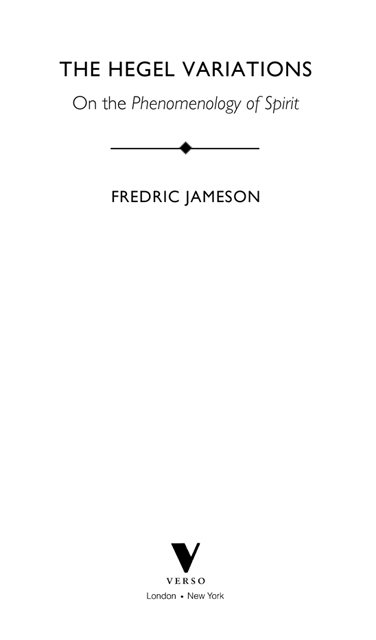First published by Verso 2010
Copyright Fredric Jameson 2010
All rights reserved
The moral rights of the author have been asserted
Verso
UK: 6 Meard Street, London W1F 0EG
US: 20 Jay Street, Suite 1010, Brooklyn, NY 11201
www.versobooks.com
Verso is the imprint of New Left Books
eISBN (US): 978-1-84467-815-0
eISBN (UK): 978-1-78168-959-2
ISBN-13: 978-1-84467-616-3
British Library Cataloguing in Publication Data
A catalogue record for this book is available from the British Library
Library of Congress Cataloging-in-Publication Data
A catalog record for this book is available from the Library of Congress
v3.1
For ripi
Contents
Chapter 1
Closure
Lets begin with the ending: it is above all else urgent not to think of Absolute Spirit as a moment, whether historical or structural or even methodological. Absolute Spirit cannot be considered as a terminus of any kind, without transforming the whole of Phenomenology of Spirit into a developmental narrative, one that can be characterized variously as teleological or cyclical, but which in either case is to be vigorously repudiated by modern, or at least by contemporary, thought of whatever persuasion.
Is it, then, to be thought of as the final unveiling of the dialectic (a word Hegel uses very sparingly indeed), or perhaps as the definitive inauguration of something Hegel is much more frequently willing to call the speculative? These descriptions have their kernel of truth, insofar as the great movement from Verstand or Understanding to Vernunft or Reason is grasped as a radical break with common-sense empiricism and with what we may also call reified thinking. In the Logic, however, the cancellation and transformation of Verstand (and this really may be considered an Aufhebung) is followed by not one but two moments, either of which might be called dialectical, albeit What ultimately makes both of these kinds of thinking unsuitable candidates for constituting a whole new historical era or moment is the persistence of Verstand within them as the ongoing and inevitable thinking of everyday life and a material world.
It is certain that Hegel is what might anachronistically be called an ideologist of the modern,
Still, might not the chapter on Absolute Spirit signal a different kind of historical inauguration, that of the appearance of a new kind of human being here and there among the general populationif not the Nietzschean superman, then at least what Kojve calls the Sage, whom he goes so far as to identify with the Platonic philosopher-king? The momentary appearance of Napoleon on the world stage lends historical weight and interest to Kojves interpretation. Yet it cannot be said that Hegels conception of the world-historical individual reinforces Kojves anthropomorphism, inasmuch as the very idea of the ruse of reason or history devalues the individual great man by demonstrating that he is merely a pawn or a tool in the hands of historical development. Kojves view here is akin to the temptation of personification in literary analysis and traditional allegory, and certainly goes against the grain of the contemporary theory anxious to decenter the subject and to invent collective or structural analyses for what used to be individualizing ones. Indeed, nothing in the final chapter of the Phenomenology suggests Hegels complicity in the idea of the Sage with which Kojve here endows him.
But surely Absolute Spirit may be seen as a kind of method, in a chapter which systematically reviews all the moments of the Phenomenology and characterizes their findings as truths for us, and insights we have only been qualified to earn on the strength of reaching this final speculative conviction about the ultimate unity of subject and object? Yet the very concept of method flattens out all the properly dialectical differences between the chapters and screens out the stimulating heterogeneity of the Phenomenology itself. The dialectic is not enhanced by its association with the truly vulgar and instrumental idea of method, a temptation we would do well to resist but which is certainly reinforced by the omnipresence of Verstand or that reified thinking of which method is so striking an example.
What may well prove more congenial to a contemporary or a postmodern public is the invocation of Marxs notion of General Intellect (which has also been foundational for the Negri/Hardt theory of the multitude). Marxs expression (found in the Grundrisse) evokes an historically new kind of general literacy in the mass public, most strikingly evinced in the trickling down of scientific knowledge (and technological know-how) in the population at large, a transformation that might also be described in terms of the displacement of a peasant (or feudal) mentality by a more general urban one (and in hindsight also comprehensible as a fundamental consequence of literacy and mass culture). At any rate, the hypothesis of such a social transformation in consciousness and mentality (in Spirit or Geist in Hegels sense) is not at all incompatible with Hegels narrative here; and it strengthens the renewed appeal of Hegels work and the revival of interest in it, in a postmodernity characterized by cynical reason and by what I will later on term plebeianization.
We must at any rate read Absolute Spirit as a symptom rather than a prophecy, and thereby rescue the Phenomenology from its stereotypical reading as an out-of-date teleology. Indeed, in what follows I will argue that the ladder of forms of this work is as open-ended as one likes. How else to explain the persistence today of that opposition between left-Hegelians (such as Kojve) and right-Hegelians (Fukuyama and the triumph of American capitalism) that had already declared itself in the struggle for his system immediately after Hegels own death?

It has been rumored that the formal paradigm for Hegels Bildungsroman was La Vie de Marianne of Marivaux (17311745): see Jacques dHondt, Hegel et Marivaux, in Europe, vol. 44, December 1966, 323337. For dHondt, however, the kinship lies less in the sequence of episodes than in Mariannes achievement of a truly divided self-consciousness.
According to Althusser, Lenin retains the second stage of the Hegelian progression (the determinations of reflection) while abandoning the more idealist dimensions of the Notion itself (in the syllogism and Life): see Louis Althusser, Lenin before Hegel, in Lenin and Philosophy, trans. Ben Brewster, New York: Monthly Review Press, 1971, 113. I tend to agree with this preference, but would rather substitute ideology for idealism. As for life, Hegels version of it, pre-Darwinian as it is, is probably far too metaphysical and epistemological (highest form of the unity of subject and object) to be of much interest for us today. Still we might give Hegel credit for the first timid step in the direction of that vitalism which, a mighty stream from Nietzsche and Tolstoy through D. H. Lawrence to Deleuze, has been so energizing a worldview (which is to say, ideology) in contemporary thought.


